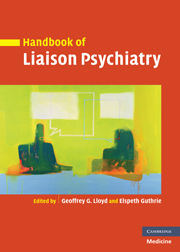Book contents
- Frontmatter
- Contents
- List of contributors
- Preface
- Part I Basic skills
- Part II Common psychiatric problems across the general hospital
- Part III Working with specific units
- Part IV Treatment
- 33 Psychopharmacological treatment in liaison psychiatry
- 34 The role of psychological treatments
- 35 Problem cases
- Part V Different treatment settings
- Index
35 - Problem cases
from Part IV - Treatment
Published online by Cambridge University Press: 10 December 2009
- Frontmatter
- Contents
- List of contributors
- Preface
- Part I Basic skills
- Part II Common psychiatric problems across the general hospital
- Part III Working with specific units
- Part IV Treatment
- 33 Psychopharmacological treatment in liaison psychiatry
- 34 The role of psychological treatments
- 35 Problem cases
- Part V Different treatment settings
- Index
Summary
Introduction
Every referral to liaison psychiatry presents its own set of clinical dilemmas. Some cases are straightforward and can be assessed and managed easily. Others are complex and require a whole host of liaison skills and a large investment of time. The complexity of the clinical case is often not obvious from the referral. The assessing liaison psychiatrist therefore requires a flexible working style and an enthusiasm for the challenges of ‘problem cases’ in order to thrive in a liaison psychiatry setting.
This chapter is composed of a number of ‘problem cases’. They are intended to replicate the process of referral, assessment and management by liaison psychiatry. Although not all types of liaison referral are covered the principles of the process are similar. The cases are described in instalments, with portions of information being added in stages. This mirrors the referral process with a small amount of information available in the referral letter, more from direct contact with the treating team, more again from past notes, the patient and informants. After each section of information a series of questions are posed. These reflect some of the questions considered during the assessment. They are designed to stimulate independent thought and debate. There may be different but valid approaches to managing cases and discussion should highlight this and encourage a flexibility of approach. Some of the answers to the questions highlighted will be found in the relevant chapters of this book, for others you may need to search more widely.
- Type
- Chapter
- Information
- Handbook of Liaison Psychiatry , pp. 818 - 844Publisher: Cambridge University PressPrint publication year: 2007

